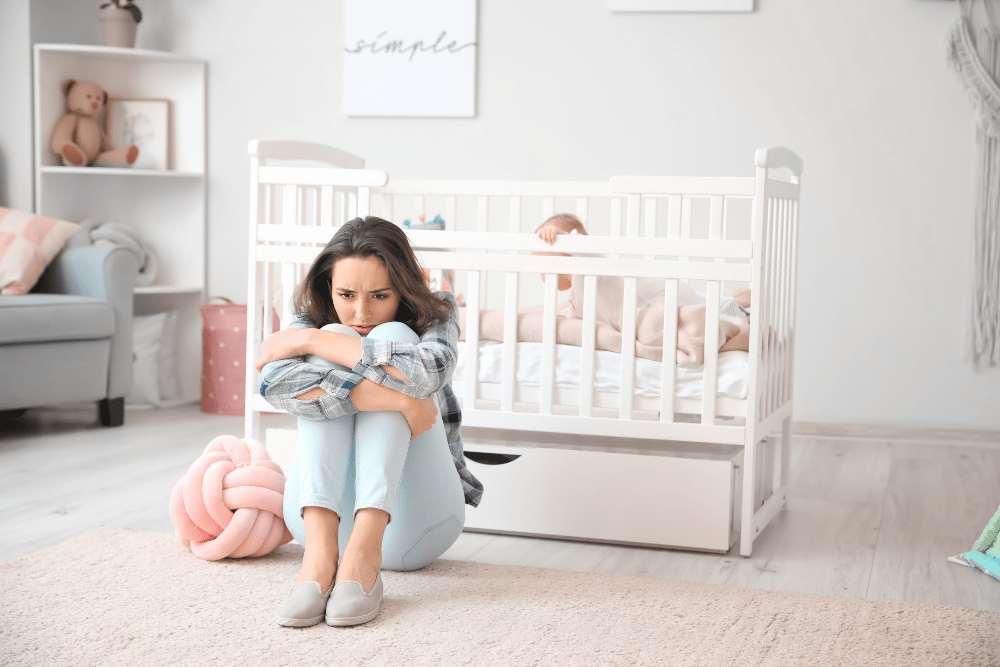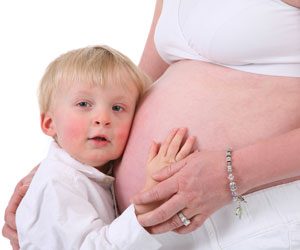
This is a tale of my postnatal depression. In the dead of night in October 2009, I gave birth to my fourth baby. The room was dim, and the air had a sombre peacefulness to it. I had gone nearly two weeks overdue with this baby, and I hadn’t been in a hurry to meet her. In fact, I would have been quite happy to remain pregnant indefinitely. Having three children already, I knew the turbulence, and the highs and lows. I knew the rapid changes of the first few days postpartum. Also, I was afraid of the changes I knew were coming.
After five-hour labour, I efficiently birthed a little girl into the pool in my mother’s lounge room. As I felt her body writhe out of mine, I automatically turned around in the water to pick up my baby. It was instinct to gather her to me because, in that same instant, I realised that I felt nothing inside. No overwhelming rush of connection, or love. No sense of achievement that I had given birth! Nothing.
In the back of my mind, as I gazed at my newborn baby (because that was what new mothers did), I knew that something was not right with this scene; something was not right with me.
Later that day I confessed to my midwife that I still felt nothing towards my baby.
She assured me that this could be normal, that sometimes the mother-child bond is slow to grow. But something had happened during that birth that changed me, some internal shift that I could not define, and as those newborn days progressed these changes became more apparent. I had no appetite. I felt very removed from reality, as though I were in a fog. In those precious early days of bed rest with my new baby, I spent hours just gazing out of the window at the blue sky. This is where a tale of postnatal depression begins.
I loved my daughter; I know I did. I breastfed her on demand, slept with her and took care of her well. Her energy was quiet, contemplative and easy-going, which perfectly matched my own melancholia, and because of this, we bonded well. But when I think back…only fleeting scenes of that time come to mind….the six-week visit with my midwife, talking about feeling trapped; taking photos of my baby at the park, and flashes from her first birthday. That is about it: I can’t remember much of her first year of life. It was swallowed by a dark cloud that also swallowed my rational mind and feeling self.
It disturbed me how I had no influence over the thoughts that ran through my head.
By eleven in the morning my energy was spent and I would feel exhausted for the rest of the day. My exhaustion meant I had no energy to defend myself from the negative self-talk that took over. I literally felt that my head had been invaded by aliens, and I did not know how to help myself. During the day, with the other children at school, I would often just sit with the baby on the lounge: just sit, feeling her body in my arms and listening to the stillness around. There could have been a delicious lunch sitting on my kitchen table but I would have no way of getting myself there to eat it.
When Zara was 3 months old I went to see my midwife, confessing that I was depressed. Neither of us was surprised, as the months of the pregnancy had been stress-filled, with me trying to hold it all together by not really addressing anything. In the two years previous to conceiving we had lived in QLD, and we had lost our home and income in rapid succession. After a stint of fruit picking and travelling (adventure-filled but also stressful), we found ourselves briefly homeless and with dire financial struggles. Moving back to Sydney and the support of friends and family in anticipation of welcoming this new life (that we had planned) was supposed to help us float. However we struggled to find our own home and rhythm, my husband’s heart remained in QLD, and we struggled more and more to support each other.
After this appointment with my midwife, I began counselling via email with another homebirth midwife.
Apart from some much-needed de-briefing, the advice was simple: to eat, regularly. To rest, every day. To go for a little walk, every day. Those three things sound like not much, but to achieve all three in one day was rare. Of course, I was still caring for four children; cooking, doing the school run, playing with them. I did all of these things on autopilot. At the time I consoled myself with the thought that the children probably couldn’t tell that I wasn’t really present – after all, hardly any adults could tell. Christmas came and went, with me feeling that the real me was hovering somewhere a few feet behind my body as it played happy families.
When Zara was five months old I returned to my part-time role running a Rudolf Steiner Playgroup. That job saved my life. I couldn’t get it together for myself, or my baby or other children. But I could pull myself out of my stupor for all those children that came for a few hours of connection each week, and for the new mothers who looked up to me as a shining example of motherhood. That job gave me three hours where I was valued, purposeful, and present. I clung to the job, aware that it was motivating me to eat better, to get more sleep, and to keep talking with my counsellor.
When Zara was a few months past her first birthday, the clouds in my mind slowly began to disperse.
There was no great event, no big ‘aha’ moment or shift. Life just began to get a little easier. I was able to begin answering back to the negative voices in my mind. My husband and I gradually reconnected, and after Zara turned two we finally moved into our own home again and went on to have another baby (but that is another story….)!
No matter how planned and longed-for a baby is, giving birth and adjusting to a new person in the family is a huge change. There will be always a tale of postnatal depression to tell. I’ve learnt to never underestimate the depth of that time – and how long it can linger. For me, going from one to two children, then from three to four, were really difficult transitions, both practically and emotionally. It took well over a year in both cases for me to fully adapt to the new family size and dynamics, and to adjust my expectations of myself and my capabilities. I’ve had to seriously rethink the ridiculously high standards I often set for myself.
Now Zara is about to turn four. She’s well adjusted, happy, and adores her big sister and baby brother. I often look back to that time when she was a baby and wonder why things had to happen that way. What lessons have I learnt from that time?
Experiencing PPD taught me that I am absolutely extremely important and need to be looked after first.
I won’t pretend that I have this lesson learnt….like all women I juggle many things and sometimes struggle to prioritise my needs. I needed support, and a break from responsibility, but I didn’t or couldn’t ask for those things. Moreover, I needed to be more loving and accepting of myself, but those turbulent years in QLD had eroded any trust I held in my own decisions and life choices.
When I became pregnant for the fifth time, I made a promise to myself to ask for the support I needed. And I did – from family, friends and midwife – and when that six-week-old baby became very ill (and remained very ill for months), I was able to be there for him; to be his strength and his home, to manage the intense stress – sometimes badly – but without getting depressed. As I get older, and as life continues with its cycles of high points and hard times, as a tale of postnatal depression continues, it feels to me that I have been forged; the flames of intense self-doubt and depression somehow moulded in me a deep strength that I have only ever been able to give thanks for.
It is true that without the clouds we cannot truly appreciate the sunshine…I find myself, often, in the midst of some mundane activity with my children and their chaos all around me, just giving thanks, and being happy.
Revised on 6th of December 2021


Recent Comments